工程管理论文(英文)
工程管理英语作文1500词
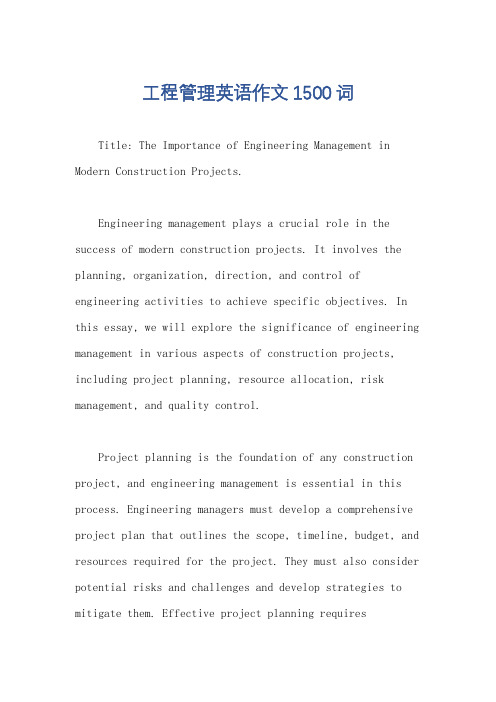
工程管理英语作文1500词Title: The Importance of Engineering Management in Modern Construction Projects.Engineering management plays a crucial role in the success of modern construction projects. It involves the planning, organization, direction, and control of engineering activities to achieve specific objectives. In this essay, we will explore the significance of engineering management in various aspects of construction projects, including project planning, resource allocation, risk management, and quality control.Project planning is the foundation of any construction project, and engineering management is essential in this process. Engineering managers must develop a comprehensive project plan that outlines the scope, timeline, budget, and resources required for the project. They must also consider potential risks and challenges and develop strategies to mitigate them. Effective project planning requiresmeticulous attention to detail and a thorough understanding of the project's requirements. Engineering managers must work closely with other stakeholders, including designers, contractors, suppliers, and clients, to ensure that all aspects of the project are addressed.Resource allocation is another critical aspect of engineering management. Construction projects require a significant amount of resources, including materials, equipment, labor, and funds. Engineering managers must ensure that these resources are allocated efficiently and effectively to maximize project efficiency andprofitability. They must also monitor resource usage throughout the project and adjust allocations as necessary to ensure that the project remains on track.Risk management is an integral part of engineering management in construction projects. Construction projects are inherently risky, and engineering managers must identify, analyze, and mitigate these risks to ensure the project's success. They must develop comprehensive risk management plans that address both known and unknown risksand monitor their implementation throughout the project. Engineering managers must also be prepared to respond quickly and effectively to any unexpected events that may arise during the project.Quality control is another crucial aspect of engineering management in construction projects. Quality is essential to the success of any construction project, and engineering managers must ensure that all work meets or exceeds specified standards and expectations. They must develop and implement quality control plans that cover all aspects of the project, including materials, equipment, workmanship, and finished products. Engineering managers must also conduct regular inspections and audits to ensure that quality standards are being met and take corrective action when necessary.In addition to these core aspects of engineering management, there are several other important considerations. For example, engineering managers must maintain effective communication with all stakeholders throughout the project to ensure that information isflowing freely and accurately. They must also develop and maintain strong leadership skills to inspire and motivate their teams to achieve project goals. Additionally, engineering managers must stay up-to-date with the latest trends and technologies in their field to ensure that their projects are as efficient and effective as possible.In conclusion, engineering management is essential to the success of modern construction projects. It involves planning, resource allocation, risk management, quality control, and communication to ensure that projects are completed on time, within budget, and to the highestquality standards. Engineering managers play a pivotal role in this process and must possess a wide range of skills and knowledge to succeed. By understanding and applying the principles of engineering management, construction projects can be delivered successfully and contribute to the economic and social development of our communities.。
工程管理英语作文

工程管理英语作文Engineering management is a multifaceted field that combines the principles of engineering with the skills of management. It is the process of planning, directing, and coordinating the activities of a project to ensure that it is completed on time, within budget, and to the required quality standards.In the realm of engineering management, communication is key. Engineers must be able to articulate their ideas clearly and effectively to a variety of stakeholders, including team members, clients, and investors. This requires a strong command of technical vocabulary and the ability to translate complex concepts into more accessible language.Project management is another critical component of engineering management. Engineers must be able to plan and organize resources effectively, set realistic timelines, and monitor progress to ensure that projects are completed successfully. This involves the use of various tools and techniques, such as Gantt charts and critical path analysis, to track and manage project schedules.Risk management is also an essential aspect of engineering management. Engineers must be able to identify and assess potential risks associated with a project and develop strategies to mitigate those risks. This may involve conducting risk assessments, developing contingency plans, and implementing risk mitigation measures.Quality management is another key area of focus for engineering managers. Ensuring that projects meet the required quality standards is crucial for maintaining client satisfaction and ensuring the success of the project. This involves implementing quality control processes, conducting regular audits, and addressing any issues that may arise.Finally, leadership and team management are vital skills for engineering managers. Engineers must be able to motivate and lead their teams effectively, fostering a collaborative and supportive work environment. This requires strong interpersonal skills, the ability to delegate tasks, and the capacity to provide constructive feedback and guidance to team members.In conclusion, engineering management is a complex and challenging field that requires a diverse range of skills and competencies. By focusing on effective communication, project management, risk management, quality management, and leadership, engineering managers can ensure the successful completion of projects and contribute to the advancement of the engineering profession.。
工程管理相关英文作文
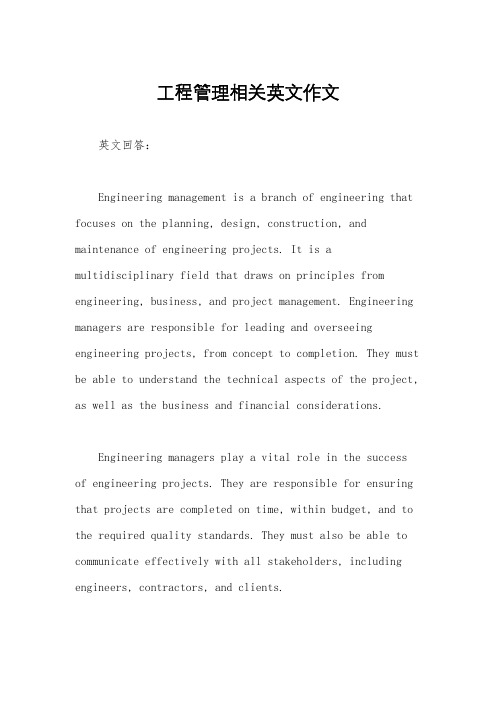
工程管理相关英文作文英文回答:Engineering management is a branch of engineering that focuses on the planning, design, construction, and maintenance of engineering projects. It is a multidisciplinary field that draws on principles from engineering, business, and project management. Engineering managers are responsible for leading and overseeing engineering projects, from concept to completion. They must be able to understand the technical aspects of the project, as well as the business and financial considerations.Engineering managers play a vital role in the success of engineering projects. They are responsible for ensuring that projects are completed on time, within budget, and to the required quality standards. They must also be able to communicate effectively with all stakeholders, including engineers, contractors, and clients.There are a number of different skills and qualifications that are required for success in engineering management. These include:A strong understanding of engineering principles。
工程管理专业 英文 作文

工程管理专业英文作文英文:As a project management major, I believe that effective communication and organization are key components to successful project completion. In order to ensure that all team members are on the same page, it is crucial to establish clear goals and expectations from the beginning. This can be achieved through the use of project management tools such as Gantt charts and project plans.Another important aspect of project management is risk management. It is important to identify potential risks and create contingency plans to mitigate them. This can involve conducting a risk analysis and developing a risk management plan.In addition, effective leadership is essential in project management. A good leader should be able to motivate and inspire team members, as well as provideguidance and support when needed. This can involve setting clear expectations, providing regular feedback, and recognizing team members for their contributions.Overall, project management requires a combination of technical skills and soft skills such as communication, organization, and leadership. By utilizing these skills, project managers can ensure that projects are completed on time, within budget, and to the satisfaction of all stakeholders.中文:作为一名工程管理专业的学生,我相信有效的沟通和组织是成功完成项目的关键组成部分。
工程管理英语论文
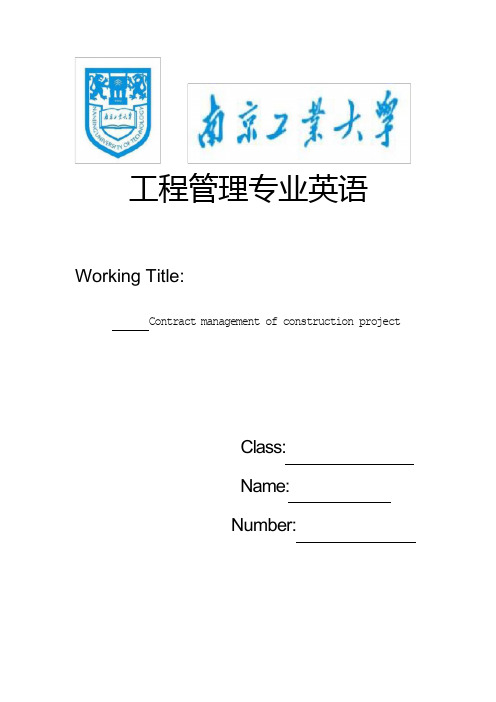
工程管理专业英语Working Title:Contract management of construction projectClass:Name:Number:A critical analysis of contract management of construction project.Contract management is an important part of project management, engineering project management through the whole process, not only determine the price of the project construction period, objectives, the quality objectives, obligations and responsibilities, and contract management is other project management system of work instructions, and the engineering project management played the overall control function. In the fierce market competition, the construction enterprise in order to be able to win the bid to get at the low success, however low quoted price behind success is the management level of the enterprise competition.At the same time due to construction enterprise as a contractor often and in a relatively passive position in the whole process of construction of the project are often natural conditions and social factors, such as the unforeseen factors, lead to risk all may happen at any time,it is for the existence of the objective factors and uncertainty, construction enterprises must improve the level of management, enhance the contract management consciousness. No contract management is no management goal,no management goal will not project management system forming, of course, will be difficult to achieve .The project management profit objectives, and even cause project paralyzed, unable to operate.Contract management is serviced for the goal of the project and the general target of the enterprise, to ensure to achieve them. Specifically, contract management includes:(1) The whole project in the planned cost (investment), to complete the project within a predetermined range, meet the quality and function of predetermined requirements, implementation of the three objectives of the project.(2) The implementation of the project smoothly, the contract dispute is less, the contract can coordinate with each other, are able to perform the contract responsibility successfully.(3) To ensure that the entire project contract signing and implementation process meets the requirements of the law.(4) A successful contract management, but also at the end of the work that was satisfactory to both parties, the owners get a qualified project, achieve the investment objective, on the project, the contractor, feel the cooperation of both sides satisfied; the contractor not only obtain the reasonable price and profit, but also won a reputation, to establish the friendly and cooperative relations. This is the requirements what the enterprise management and the development strategy need the contract management to do.To use the theory to ensure the project can be carried out smoothly1) ObjectiveMacroscopically, the objective of the contract management is to strengthen supervision and management of construction activities,maintain the market order ,guarantee quality and safety of the project ,simulative construction industry health develops, To provide a legal basis for every part of a project ,at the same time, will definitely provide useful help to construction industry to take an active role in the international standardization activities。
工程管理英文文献1500词范文
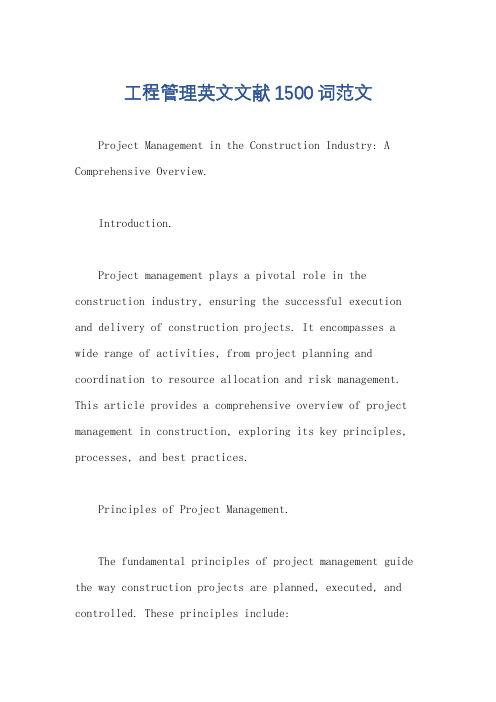
工程管理英文文献1500词范文Project Management in the Construction Industry: A Comprehensive Overview.Introduction.Project management plays a pivotal role in the construction industry, ensuring the successful execution and delivery of construction projects. It encompasses a wide range of activities, from project planning and coordination to resource allocation and risk management. This article provides a comprehensive overview of project management in construction, exploring its key principles, processes, and best practices.Principles of Project Management.The fundamental principles of project management guide the way construction projects are planned, executed, and controlled. These principles include:Project Planning: Establishing a clear and detailed plan that outlines project objectives, scope, deliverables, and timelines.Communication: Maintaining effective communication among project stakeholders, including owners, contractors, suppliers, and consultants.Risk Management: Identifying and mitigating potential risks that may impact project outcomes.Collaboration: Fostering teamwork and collaboration among project members to achieve common goals.Control: Regularly monitoring and evaluating project progress to ensure adherence to plans and objectives.Project Management Processes.Project management in construction involves several key processes that are typically executed sequentially:1. Project Initiation: Defining the project scope, objectives, and feasibility.2. Project Planning: Developing a detailed project plan that outlines tasks, resources, and timelines.3. Project Execution: Implementing the project plan and managing resources to achieve project deliverables.4. Project Monitoring and Control: Tracking progress, identifying deviations, and taking corrective actions to ensure successful project completion.5. Project Closure: Finalizing deliverables, completing documentation, and evaluating project performance.Best Practices in Project Management.To optimize project outcomes, construction industry professionals follow established best practices, such as:Use of Project Management Software: Utilizing project management software can streamline planning, scheduling, and collaboration.Stakeholder Engagement: Actively engaging project stakeholders throughout the project lifecycle to ensure alignment and buy-in.Risk Management Framework: Implementing a structured risk management framework to identify, assess, and manage project risks effectively.Change Management Process: Establishing a clear and proactive process for managing project changes to minimize disruptions and ensure project success.Continuous Improvement: Regularly reviewing project performance and seeking opportunities for improvement to enhance future project outcomes.Benefits of Effective Project Management.Effective project management in construction brings numerous benefits, including:On-Time Delivery: Adherence to project schedules and timelines, meeting stakeholder expectations.Cost Control: Managing project costs effectively, minimizing overruns and staying within budget.Quality Assurance: Ensuring high-quality construction outcomes that meet project specifications and industry standards.Risk Mitigation: Identifying and managing risks proactively, safeguarding projects from potential threats and ensuring smooth execution.Improved Stakeholder Satisfaction: Maintaining strong relationships with project stakeholders by delivering successful projects that align with their needs and objectives.Conclusion.Project management is essential for the successful execution of construction projects. By understanding its key principles, following established processes, and implementing best practices, construction industry professionals can optimize project outcomes, ensure on-time delivery, control costs, manage risks, and enhance stakeholder satisfaction. As the construction industry continues to evolve, leveraging advanced technologies and innovative approaches to project management will become increasingly critical for project success.。
[工程管理论文(英文)] 工程管理专业论文
![[工程管理论文(英文)] 工程管理专业论文](https://img.taocdn.com/s3/m/847751084b7302768e9951e79b89680203d86bd7.png)
[工程管理论文(英文)] 工程管理专业论文 Modern engineering project have a tendency to develop into large scale andmodern with the complexity of project increase exponentially, only manage and control strictly, the quality and schedule of construction can be guaranteed under the condition of growing investments.Therefore, modern project management mode of “Make detailed planning comprehensively, according to plan strictly, feedback and update timely, track and contrast closely” can’t carry out only through manual lab, only using computer business management system and simple computer network manage pattern also can ’t meet the actual managedemand. On this basis, we think that modern construction project management enterprise to realize modern management model need shifting to intellective management enterprise, establishing the theory and practice framework of enterprise knowledge management combined with computer, knowledge will become the sword of management.Since the reform and opening-up, the numbers of China construction enterprise have increasing rapidly, but from the actual situation there is a gap between China and international in ability to construction project management, which affects the project management level in China. And the quality of project is an important indicator of project management, Therefore, reforming traditionalproject management model and improve the quality of quality have became import issue of construction enterprises. The construction industry is one of basic industries in our country, its normal operation related to the sustained development of the national economy directly. In recent years, with the development of market economy have been establishedand perfected gradually in China, the construction industry has got an unprecedented improvement. Meanwhile, the rapid development has exposed many problems, the construction project quality, especially the residential construction quality, has became the focus of attention. Engineering projects as construction projectproducts invests and consumes much manual lab, material and energy, construction project quality related to engineering applicability and safeties of lives and property of people. On the other hand, it’s related to the survival of enterprises, so the quality management on the top position is imperative.Construction project item management is a one-time comprehensive management and control to optimizing the goal with target, goal and content based on specific construction projects. Its connotation is: from the project start to finish, reaching the goal of quality, rate of progress, cost and safety through the project planning and project control. In view of the constructionproject is disposable, in order to save investment, achieve the goal of energy-saving emission and construction target, and build construction products in accordance with the requirements, we construction personnel must be aware of the importance of project management in the construction process, and pay attention to reinforcing the following aspects in the construction project management in particular case.(I) Quality managementQuality is the life of enterprises and the fundamental guarantee for the development of enterprises. Today, construction market competition has more and more intense. How to improve the quality of the construction management level isevery enterprise managers need to think about.(i) Regime of quality supervision The quality management of the construction project can be summarized by the following words: set goals and clear the lines of responsibility; assign and put it into effect, explain in detail; contra posing the difficulty organizes research; set an example and explore experiences; tracking control and control strictly, do a good job of quality control and regular monitor of the quality of products. Establishing and improving the system of whole process quality monitoring, intervening and controlling project quality through scientific method, means and control mechanism to let the project quality always in a dynamic management.① Establish the system of quality self-checking. The quality of project involves all aspects of society, and also reflects the level of enterprises management synthetically. In general, any construction project should accept supervision from the enterprises itself. Enterprises self-checking require any construction company establish a effective system of quality supervision, and through the run of this system to improve quality continuously.② Quality supervision by the third-party. It means enterprises shouldaccept the supervision by owner, and the type of supervision is the most authoritative now. These two types of quality supervision in above workclearly, communicate closely and compose to the complete system of control construction project quality, so that enterprises can promise project quality achieve desired expect.(ii) The supervision methods and meansAs an administrative staff, controlling the quality of engineeringconstruction is the most important thing inlocale management. Whether the quality of projectis good or bad depends on the management level of inspector and the supervision.① The site supervision in each process of construction operation shouldfound the problem on-site, point out and correct, use the methods measure honestly combined withoverall look-and-feel.② Call all on-site management personnel together to specify thecommon problem in the construction process, have a in-depth knowledge to construction workers, and correct mistakes timely.③ Write the book of quality control and guidance document. For those quality problems may occur or has occurred, we management personnel should do an introduction and countermeasures in detail, clear responsibility and claim related personnel correct on time.(II) Schedule management Whether the project can be delivered within agreed timeframe have a direct influence on the development of project economicand social effect results benefit. The factor of human, technology, material, equipment, machine, foundation, funds, climate and environment all affect the process of project schedule. In order to do a good schedule management of project, we need solving the following problems focused.① Establish the pattern and framework of project management. A successful project must have a successful management team and a standard work mode, operating procedures and business system.② Establish a strict contract network system. A large project is acommunity consists of many construction workers, so it needs a strict contract system to mobilize the enthusiasm of all people so that can avoidsabotage and wrangling each other.③ Develop a practical project plan of three grades. This plan requires not only the work of construction organization, but also the work of owners, design company and supervision company, what’s more, we should take government which very relative to construction into consideration.④ Determine the design company, sign the design contract and thecheck and review of design quality and speed. Whether the project construction can be carried out smoothly depends on the quality of design.⑤ The bids and evaluation of construction organization, the sign ofconstruction contract, including the choicebetween general contractor and sub-contractors, and sign the contract of support of material and equipment.⑥ Handle government formalities in earlier stage project plan andarrange the municipal auxiliary projects. Sufficient communication with government and good relationship are promise to successful project. (III) Cost controlThe type of Construction project cost is divided into the budgetcost, plan cost and actual cost. Under the situation of construction cost meet schedule and quality, through the methods of origination, economics, technology and contracts to control thecost in the range of expect. To tighten the project cost management, we can undertake it in the following aspects:① The enterprises should formulate the work quota, and those money should use according to engineering quantities, and we should calculate the total quantities of manmade. We can control the manmade cost as long as control the manmade quantities so that control the project cost.② Strengthen material management, establish the system of limits of material requisition, manage the material out of storage strictly, lump sum to those material cost much in site.③ Improve the utilization rate of equipment and materials. Check on,repair and maintain the construction machine regularly, rented equipment and material should return to rent company on time to speed up the construction period and reduce the rent cost.④ Choose a correct construction scheme is the key to shorten theconstruction period, improve quality and reduce the cost, in the process of construction, we should try our best to search new techniques, new technology, new materials to r educe costs, improve efficiency.⑤ Be strict in construction: construction inline with the drawings and the standard, be strict in quality to ensure project quality, reduce the waste of labor and material caused by rework.⑥ Streamline the management mechanism, reduce the level of management to save the construction management fees. (IV) Security managementSafety production management of construction projects –organize all activities of production safety, through the control of production factors to reduce or eliminate unsafe behavior and state, does not cause the accident, so as to the normal operation of construction project.① Adhere to principle of security management. Safety and production are synchronous so that if control the production safety also should be controlled, safety contain in the production,what ’s more, promote and promise the production. Safe working is common thing of anyone relativewith production rather than only relative with minority and security mechanism, lack of full participation, securitynot obvious.② Adhere to control the unsafe behaviors of human and unsafe states of things. From the analysis of the causes of the accident, we can get that human, things and environment is the fundamental reason of accident. From the human and things management sides to analyze accident, unsafe human behaviors and unsafe things states are both fundamental reason of accident.③ Establish safety management measures. Strengthen the safety management of construction engineering, formulate practical safety managementsystem and measures are very important. According to the production management does not havevitality, and effect ischaracteristics of construction engineering , formulate the detailed project safety risk prediction and the corresponding guarantee measure and decompose the project risk, implement the safety responsibility to every apartment, every team and everyone to easier management.To sum up, the construction project management is a systematicproject which includes risk, investment, contract, schedule, quality, personnel and other aspects of the work, and relates to the and design, other supervision, construction, equipment,materials, operationsdepartments and units. Therefore, only all sides cooperate positively and cogent strengthen construction engineering management of quality, cost, schedule and security so that construction engineering project can be carried out smoothly and create a good economic benefits for the enterprise.。
工程管理前沿英文作文

工程管理前沿英文作文英文:Engineering management is a constantly evolving field that requires professionals to stay up-to-date with the latest trends and technologies. As someone who has been working in this field for several years, I can attest to the importance of staying on top of industry developments.One trend that has emerged in recent years is the use of agile project management methodologies. Agile approaches prioritize flexibility and adaptability, allowing teams to respond quickly to changes in project requirements or customer needs. This can be especially useful in fast-paced industries like software development or manufacturing.Another important trend in engineering management is the increasing use of data analytics. With the rise of big data, companies are now able to collect and analyze vast amounts of information about their operations, customers,and competitors. This data can be used to make more informed decisions about everything from product design to supply chain management.Of course, these are just a few examples of the many trends and developments in engineering management today. The key is to stay curious and open-minded, always looking for new ways to improve your processes and deliver better results for your organization.中文:工程管理是一个不断发展的领域,需要专业人士跟上最新的趋势和技术。
工程项目管理的英文文献(3篇)
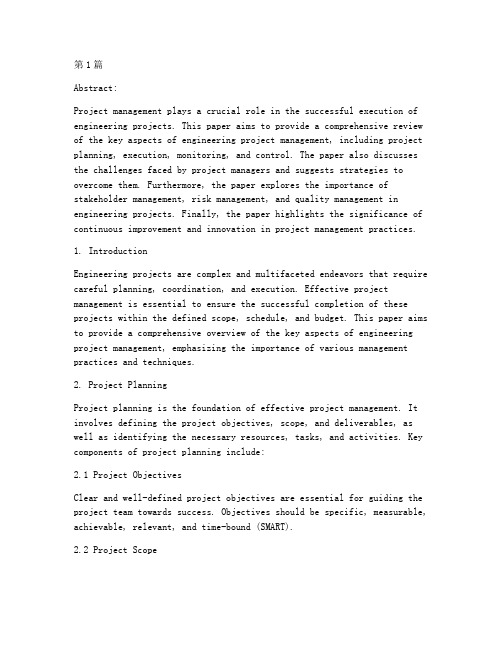
第1篇Abstract:Project management plays a crucial role in the successful execution of engineering projects. This paper aims to provide a comprehensive review of the key aspects of engineering project management, including project planning, execution, monitoring, and control. The paper also discusses the challenges faced by project managers and suggests strategies to overcome them. Furthermore, the paper explores the importance of stakeholder management, risk management, and quality management in engineering projects. Finally, the paper highlights the significance of continuous improvement and innovation in project management practices.1. IntroductionEngineering projects are complex and multifaceted endeavors that require careful planning, coordination, and execution. Effective project management is essential to ensure the successful completion of these projects within the defined scope, schedule, and budget. This paper aims to provide a comprehensive overview of the key aspects of engineering project management, emphasizing the importance of various management practices and techniques.2. Project PlanningProject planning is the foundation of effective project management. It involves defining the project objectives, scope, and deliverables, as well as identifying the necessary resources, tasks, and activities. Key components of project planning include:2.1 Project ObjectivesClear and well-defined project objectives are essential for guiding the project team towards success. Objectives should be specific, measurable, achievable, relevant, and time-bound (SMART).2.2 Project ScopeThe project scope defines the boundaries and deliverables of the project. It is crucial to clearly define the scope to avoid scope creep andensure that the project remains on track.2.3 Work Breakdown Structure (WBS)A work breakdown structure (WBS) is a hierarchical decomposition of the project scope into smaller, manageable components. It helps inorganizing and planning the project activities.2.4 Resource PlanningEffective resource planning ensures that the necessary resources, suchas personnel, equipment, and materials, are available at the right time and in the right quantity.2.5 Schedule PlanningA project schedule outlines the sequence of activities and their durations. Critical path method (CPM) and program evaluation and review technique (PERT) are commonly used techniques for schedule planning.3. Project ExecutionProject execution is the phase where the planned activities are implemented. This phase involves coordinating the efforts of the project team, managing resources, and ensuring that the project progresses as planned. Key aspects of project execution include:3.1 CommunicationEffective communication is crucial for the successful execution of engineering projects. Regular meetings, progress reports, and collaboration tools are essential for maintaining open lines of communication among project stakeholders.3.2 Risk ManagementRisk management involves identifying, assessing, and mitigatingpotential risks that may impact the project. Techniques such as riskidentification, risk analysis, and risk response planning are used to manage risks effectively.3.3 Quality ManagementQuality management ensures that the project deliverables meet the required standards and specifications. Techniques such as quality planning, quality control, and quality assurance are employed to maintain high-quality standards.4. Project Monitoring and ControlProject monitoring and control involve tracking the project's progress, comparing it with the baseline plan, and taking corrective actions when necessary. Key activities in this phase include:4.1 Progress TrackingProgress tracking involves monitoring the completion of project activities and comparing them with the baseline schedule. Techniques such as earned value management (EVM) are used for progress tracking.4.2 Performance MeasurementPerformance measurement involves assessing the project's performance against the planned objectives, schedule, and budget. This helps in identifying deviations and taking corrective actions.4.3 Change ManagementChange management involves managing changes to the project scope, schedule, and resources. Effective change management ensures that changes are controlled and documented.5. Stakeholder ManagementStakeholder management is crucial for the successful execution of engineering projects. It involves identifying, analyzing, and managing the interests, expectations, and influence of stakeholders. Key aspects of stakeholder management include:5.1 Stakeholder IdentificationIdentifying all stakeholders involved in the project is essential for understanding their needs and expectations.5.2 Stakeholder AnalysisStakeholder analysis helps in assessing the power, interest, and influence of stakeholders to determine their level of engagement in the project.5.3 Stakeholder EngagementEngaging stakeholders throughout the project lifecycle ensures their satisfaction and support for the project objectives.6. Risk ManagementRisk management is a critical aspect of engineering project management.It involves identifying, assessing, and mitigating potential risks that may impact the project. Key risk management techniques include:6.1 Risk IdentificationRisk identification involves identifying potential risks that may affect the project's success.6.2 Risk AnalysisRisk analysis involves assessing the probability and impact ofidentified risks to prioritize them.6.3 Risk Response PlanningRisk response planning involves developing strategies to mitigate, avoid, transfer, or accept risks.7. Quality ManagementQuality management is essential for ensuring that the projectdeliverables meet the required standards and specifications. Key quality management techniques include:7.1 Quality PlanningQuality planning involves defining the quality objectives and requirements for the project.7.2 Quality ControlQuality control involves monitoring the project activities to ensurethat they comply with the defined quality standards.7.3 Quality AssuranceQuality assurance involves establishing and maintaining processes to ensure that the project deliverables meet the required quality standards.8. Continuous Improvement and InnovationContinuous improvement and innovation are crucial for the long-term success of engineering projects. This involves:8.1 Lessons LearnedDocumenting lessons learned from completed projects helps in identifying best practices and areas for improvement.8.2 Continuous Improvement InitiativesImplementing continuous improvement initiatives, such as Lean and Six Sigma, helps in enhancing project performance and reducing waste.9. ConclusionEffective project management is essential for the successful execution of engineering projects. This paper has provided a comprehensive review of the key aspects of engineering project management, including project planning, execution, monitoring, and control. Additionally, the paper has highlighted the importance of stakeholder management, risk management, and quality management in engineering projects. Finally, the paper has emphasized the significance of continuous improvement and innovation in project management practices. By adopting these management practices and techniques, project managers can increase the likelihood of project success and deliver value to stakeholders.第2篇Abstract:Engineering projects are complex endeavors that require careful planning, coordination, and execution. Effective project management is crucial for the successful completion of these projects. This paper discusses the challenges faced in engineering project management and proposessolutions to address these challenges. The paper also highlights the importance of project management in ensuring the quality, time, and budget constraints of engineering projects are met. Furthermore, it provides insights into the key aspects of project management, such as planning, execution, monitoring, and control.1. IntroductionEngineering projects are vital for the development of infrastructure, industries, and technologies. They require a combination of expertise, skills, and resources to be successfully completed. Effective project management is essential in ensuring that these projects are completed on time, within budget, and to the desired quality standards. This paper aims to explore the challenges and solutions in engineering project management, with a focus on the key aspects of project management.2. Challenges in Engineering Project Management2.1 Resource AllocationOne of the primary challenges in engineering project management is resource allocation. This involves determining the optimal distribution of resources such as labor, materials, and equipment to various tasks. Inadequate resource allocation can lead to delays, increased costs, and compromised quality.2.2 Risk ManagementEngineering projects are prone to various risks, such as technical, financial, and environmental risks. Identifying, analyzing, andmitigating these risks is a critical aspect of project management.Failing to manage risks effectively can result in project failure or significant financial losses.Effective communication is essential for the successful execution of engineering projects. Poor communication can lead to misunderstandings, delays, and conflicts among team members, stakeholders, and clients.2.4 Stakeholder ManagementEngineering projects involve various stakeholders, including clients, contractors, consultants, and regulatory authorities. Managing the expectations and interests of these stakeholders is a challenging task. Inadequate stakeholder management can lead to disputes, delays, and project failure.3. Solutions to Challenges in Engineering Project Management3.1 Resource AllocationTo address resource allocation challenges, project managers should adopt the following strategies:- Develop a comprehensive project plan that includes detailed resource requirements for each task.- Utilize project management software to track resource utilization and identify bottlenecks.- Implement a resource leveling process to optimize resource allocation and minimize idle time.3.2 Risk ManagementTo manage risks effectively, project managers should:- Conduct a thorough risk assessment to identify potential risks and their impact on the project.- Develop a risk management plan that includes risk mitigationstrategies and contingency plans.- Regularly monitor and update the risk management plan as new risks emerge or existing risks evolve.To improve communication, project managers should:- Establish clear communication channels and protocols for the project team.- Conduct regular meetings and progress updates to ensure all stakeholders are informed.- Utilize project management software to facilitate communication and collaboration among team members.3.4 Stakeholder ManagementTo manage stakeholders effectively, project managers should:- Develop a stakeholder engagement plan that outlines the roles, responsibilities, and communication channels for each stakeholder.- Regularly engage with stakeholders to gather feedback, manage expectations, and resolve conflicts.- Foster a collaborative environment that encourages open communication and constructive dialogue among stakeholders.4. Key Aspects of Effective Project Management4.1 PlanningEffective project planning involves defining project objectives, scope, and deliverables. It also includes identifying project milestones, developing a work breakdown structure, and estimating project resources and timelines.4.2 ExecutionProject execution involves the coordination and implementation of the project plan. This includes assigning tasks to team members, monitoring progress, and ensuring that resources are utilized efficiently.4.3 MonitoringMonitoring involves tracking project performance against the planned objectives and milestones. This helps project managers identify deviations and take corrective actions to bring the project back on track.4.4 ControlProject control involves managing changes, conflicts, and issues that arise during the project lifecycle. It includes updating the project plan, adjusting resources, and revising timelines as necessary.5. ConclusionEffective project management is crucial for the successful completion of engineering projects. This paper has discussed the challenges faced in engineering project management, such as resource allocation, risk management, communication, and stakeholder management. It has also proposed solutions to address these challenges and highlighted the key aspects of project management. By adopting these strategies and focusing on the critical aspects of project management, organizations can improve their chances of delivering successful engineering projects within the desired quality, time, and budget constraints.Keywords: engineering project management, resource allocation, risk management, communication, stakeholder management, project planning, execution, monitoring, control第3篇Abstract:This paper aims to provide a comprehensive study on project managementin engineering projects. It discusses the importance of effectiveproject management, identifies key challenges, and proposes solutions to enhance project success. The paper also examines the role of project managers, project planning, risk management, and communication in achieving project objectives. Furthermore, it explores the use of modern technologies in project management and highlights the importance of continuous improvement in the field.1. Introduction1.1 BackgroundEngineering projects involve complex activities that require coordination, planning, and execution. Effective project management is crucial for ensuring project success, minimizing risks, and delivering projects within time and budget constraints. This paper provides an overview of project management in engineering projects, highlighting its importance, challenges, and solutions.1.2 ObjectivesThe objectives of this paper are:1. To understand the significance of effective project management in engineering projects.2. To identify key challenges faced by project managers in engineering projects.3. To propose solutions to enhance project success.4. To explore the role of project managers, project planning, risk management, and communication in achieving project objectives.5. To examine the use of modern technologies in project management.6. To emphasize the importance of continuous improvement in the field of project management.2. Importance of Effective Project Management2.1 Achieving Project ObjectivesEffective project management ensures that projects are completed on time, within budget, and according to specified quality standards. This helps organizations meet their strategic goals and deliver value to stakeholders.2.2 Risk MitigationProject management helps identify, analyze, and mitigate risks that may affect project success. By proactively managing risks, organizations can minimize potential losses and enhance project performance.2.3 Resource OptimizationEffective project management ensures that resources, such as labor, materials, and equipment, are utilized efficiently. This helps reduce waste, improve productivity, and lower costs.2.4 Stakeholder SatisfactionBy delivering projects successfully, project management helps satisfy stakeholders, including clients, investors, and employees. This leads to increased trust, loyalty, and business opportunities.3. Key Challenges in Engineering Project Management3.1 CommunicationEffective communication is essential for project success. However, challenges such as language barriers, cultural differences, and inadequate communication channels can hinder project progress.3.2 Resource ConstraintsLimited resources, such as budget, time, and labor, can impact project performance. Project managers must find ways to optimize resource allocation and manage constraints effectively.3.3 Stakeholder ManagementEngaging and managing stakeholders with diverse interests and expectations can be challenging. Project managers must balance stakeholder needs and ensure their satisfaction throughout the project lifecycle.3.4 Technological ComplexityEngineering projects often involve complex technologies and systems. Keeping up with technological advancements and managing technical challenges is crucial for project success.4. Solutions to Enhance Project Success4.1 Effective CommunicationImplementing robust communication strategies, such as regular meetings, clear documentation, and the use of project management tools, can improve communication and collaboration among team members and stakeholders.4.2 Resource OptimizationUtilizing project management techniques like earned value management (EVM) and critical path method (CPM) can help optimize resource allocation and manage constraints effectively.4.3 Stakeholder ManagementEngaging stakeholders early in the project lifecycle, identifying their needs and expectations, and establishing effective communication channels can enhance stakeholder satisfaction and reduce conflicts.4.4 Technological IntegrationAdopting modern technologies, such as cloud computing, artificial intelligence, and big data analytics, can streamline project processes, improve decision-making, and enhance project performance.5. Role of Project Managers, Project Planning, Risk Management, and Communication5.1 Project ManagersProject managers play a crucial role in ensuring project success. They are responsible for planning, executing, and closing projects, managing resources, and coordinating activities to achieve project objectives.5.2 Project PlanningEffective project planning involves defining project scope, objectives, and deliverables, identifying activities, estimating resources, and developing a timeline. This helps in setting realistic expectations and managing project risks.5.3 Risk ManagementRisk management involves identifying, analyzing, and mitigating risks that may impact project success. By proactively managing risks, project managers can minimize potential losses and enhance project performance.5.4 CommunicationCommunication is essential for project success. Effective communication ensures that stakeholders are informed, engaged, and aligned with project objectives. It also fosters collaboration and trust among team members.6. Use of Modern Technologies in Project Management6.1 Cloud ComputingCloud computing enables project managers to access project information, collaborate with team members, and manage resources from anywhere, at any time. It also facilitates data sharing and improves project visibility.6.2 Artificial Intelligence and Machine LearningArtificial intelligence and machine learning algorithms can assist project managers in predicting project outcomes, identifying risks, and optimizing resource allocation.6.3 Big Data AnalyticsBig data analytics can help project managers gain insights from vast amounts of project data, enabling them to make informed decisions, identify trends, and improve project performance.7. Continuous Improvement in Project ManagementContinuous improvement is essential for enhancing project management practices. Organizations should adopt a culture of continuous learning and innovation, encouraging project managers to share best practices, adopt new technologies, and implement process improvements.8. ConclusionEffective project management is vital for the success of engineering projects. This paper has discussed the importance of project management, identified key challenges, and proposed solutions to enhance project success. By focusing on effective communication, resource optimization, stakeholder management, and the use of modern technologies, project managers can improve project performance and deliver value to stakeholders. Continuous improvement and a commitment to excellence are crucial for achieving long-term success in the field of project management.。
工程管理英语作文1500词
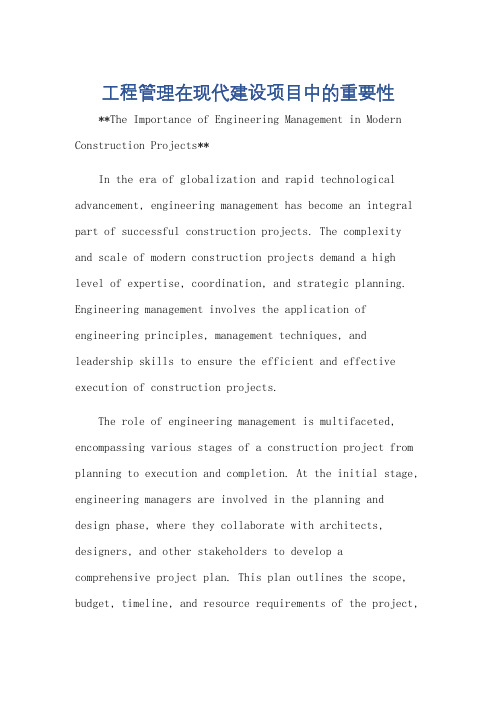
工程管理在现代建设项目中的重要性**The Importance of Engineering Management in Modern Construction Projects**In the era of globalization and rapid technological advancement, engineering management has become an integral part of successful construction projects. The complexity and scale of modern construction projects demand a high level of expertise, coordination, and strategic planning. Engineering management involves the application of engineering principles, management techniques, and leadership skills to ensure the efficient and effective execution of construction projects.The role of engineering management is multifaceted, encompassing various stages of a construction project from planning to execution and completion. At the initial stage, engineering managers are involved in the planning and design phase, where they collaborate with architects, designers, and other stakeholders to develop a comprehensive project plan. This plan outlines the scope, budget, timeline, and resource requirements of the project,ensuring that all stakeholders are aligned with the objectives and expectations.During the execution phase, engineering managers are responsible for overseeing the construction process, ensuring that it adheres to the approved plan. They manage the team of engineers, contractors, and subcontractors, ensuring effective communication and coordination. Engineering managers also monitor the progress of the project, identify potential risks and issues, and implement mitigation measures to ensure that the project remains on track.The role of engineering management is further emphasized in the post-construction phase, where they are involved in the commissioning, maintenance, and repair of the constructed facility. They ensure that the facility meets the design requirements and performs optimally, while also identifying and addressing any issues that may arise during its operational phase.The importance of engineering management in modern construction projects cannot be overstated. It is the driving force behind the successful execution of complexconstruction projects, ensuring that they are delivered on time, within budget, and to the satisfaction of all stakeholders. Engineering managers bring together the expertise and resources required to address the unique challenges of each project, enabling the construction industry to continue to innovate and progress.工程管理在现代建设项目中的重要性不言而喻。
工程管理英语大作文

工程管理英语大作文The Essence of Engineering Management.Engineering management, a discipline that blends the technical know-how of engineering with the managerialskills of organization and leadership, is crucial intoday's rapidly advancing technological landscape. It involves the planning, design, implementation, and supervision of engineering projects, ensuring theirefficient execution and timely completion. This article delves into the intricacies of engineering management, exploring its significance, challenges, and future prospects.The Importance of Engineering Management.Engineering management plays a pivotal role in the success of any engineering project. It ensures that the project is carried out efficiently, effectively, and within budget. The engineering manager is responsible for leadinga team of engineers and other professionals, coordinating their efforts, and ensuring that the project meets its objectives.The role of the engineering manager extends beyond mere supervision. They must possess a deep understanding of the technical aspects of the project, while also having the ability to manage people, resources, and time. They must be adept at problem-solving, decision-making, and risk management, skills that are crucial in navigating the complexities of engineering projects.Challenges in Engineering Management.Engineering management presents its own unique set of challenges. One of the most significant challenges is managing the diverse team of professionals involved in a project. Engineering projects often involve a mix of engineers, architects, designers, contractors, and other specialists, each with their own area of expertise and working styles. The engineering manager must be able to bring these individuals together, fostering a collaborativeenvironment where everyone can contribute effectively.Another challenge lies in managing the ever-changing technological landscape. Technology is constantly evolving, and engineering managers must keep themselves abreast of the latest advancements to ensure that their projects are up-to-date and competitive.Furthermore, engineering projects often involve strict deadlines and budgets. Managing these constraints while ensuring the quality of the project can be a daunting task. Engineering managers must have excellent planning and organizational skills to balance these competing demands.Future Prospects of Engineering Management.Despite the challenges, the future of engineering management looks bright. With the continuous advancement of technology and the increasing complexity of engineering projects, the need for skilled engineering managers is likely to grow.The emergence of new technologies such as artificial intelligence, robotics, and the Internet of Things is expected to transform the engineering landscape. Engineering managers will need to adapt to these changes, leveraging technology to improve project efficiency and effectiveness.Additionally, the increasing globalization of the engineering industry presents new opportunities for engineering managers. Projects are no longer confined to a single country or region; they often involve teams from different cultures and backgrounds. Engineering managers who possess strong leadership and communication skills will be well-positioned to capitalize on these global opportunities.Conclusion.Engineering management is a crucial discipline thatlies at the heart of any successful engineering project. It requires a unique blend of technical knowledge, managerial skills, and leadership abilities. As the engineeringindustry continues to evolve and expand, the role of engineering managers will become even more important. By staying abreast of the latest trends and technologies, and fostering a collaborative and innovative culture, engineering managers can help their teams deliver projects that are not only technically sound but also contribute positively to society.。
工程项目管理的论文英文
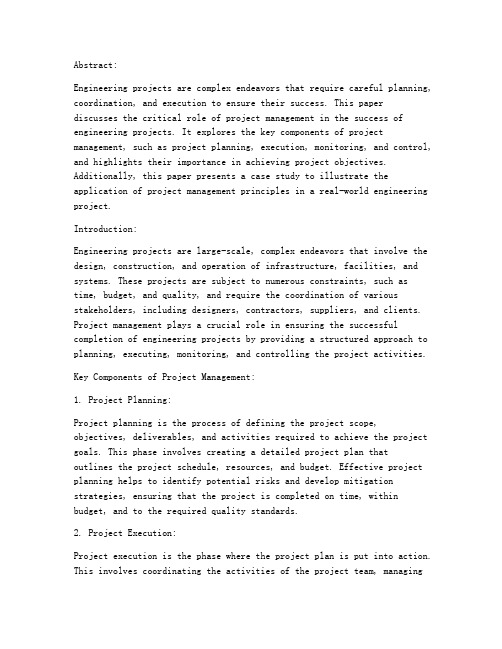
Abstract:Engineering projects are complex endeavors that require careful planning, coordination, and execution to ensure their success. This paperdiscusses the critical role of project management in the success of engineering projects. It explores the key components of project management, such as project planning, execution, monitoring, and control, and highlights their importance in achieving project objectives. Additionally, this paper presents a case study to illustrate the application of project management principles in a real-world engineering project.Introduction:Engineering projects are large-scale, complex endeavors that involve the design, construction, and operation of infrastructure, facilities, and systems. These projects are subject to numerous constraints, such as time, budget, and quality, and require the coordination of various stakeholders, including designers, contractors, suppliers, and clients. Project management plays a crucial role in ensuring the successful completion of engineering projects by providing a structured approach to planning, executing, monitoring, and controlling the project activities.Key Components of Project Management:1. Project Planning:Project planning is the process of defining the project scope, objectives, deliverables, and activities required to achieve the project goals. This phase involves creating a detailed project plan thatoutlines the project schedule, resources, and budget. Effective project planning helps to identify potential risks and develop mitigation strategies, ensuring that the project is completed on time, within budget, and to the required quality standards.2. Project Execution:Project execution is the phase where the project plan is put into action. This involves coordinating the activities of the project team, managingresources, and ensuring that the project deliverables are produced according to the plan. Effective project execution requires strong leadership, communication, and collaboration skills to keep the project on track and address any unforeseen issues that may arise.3. Project Monitoring and Control:Project monitoring and control involve tracking the progress of the project, comparing it to the project plan, and taking corrective actions when necessary. This phase ensures that the project remains on schedule, within budget, and meets the required quality standards. Key performance indicators (KPIs) are used to measure the project's progress, and variance analysis techniques are employed to identify and address any deviations from the plan.4. Project Closure:Project closure is the final phase of the project management process, where the project deliverables are delivered to the client, and the project is formally closed. This phase involves documenting the project outcomes, conducting a post-project review, and celebrating theproject's success. Effective project closure helps to capture lessons learned and improve future project performance.Case Study: Application of Project Management Principles in a Real-World Engineering ProjectThis paper presents a case study of a real-world engineering project to illustrate the application of project management principles. The project involved the construction of a new highway, which was subject to numerous constraints, such as tight timelines, budget limitations, and environmental concerns. The project team employed a structured project management approach, including project planning, execution, monitoring, and control, to ensure the successful completion of the project.The project planning phase involved identifying the project scope, objectives, and deliverables, as well as developing a detailed project schedule, budget, and risk management plan. During the project execution phase, the project team coordinated the activities of variousstakeholders, managed resources effectively, and addressed any unforeseen issues that arose. The project monitoring and control phase involved tracking the project's progress, comparing it to the plan, and taking corrective actions when necessary. Finally, the project closure phase involved delivering the project deliverables to the client, conducting a post-project review, and celebrating the project's success.Conclusion:Project management plays a crucial role in the success of engineering projects. By implementing a structured approach to planning, executing, monitoring, and controlling project activities, project managers can ensure that projects are completed on time, within budget, and to the required quality standards. This paper highlights the importance of project management in engineering projects and presents a case study to illustrate the application of project management principles in a real-world context.。
工程管理专业英语作文120字
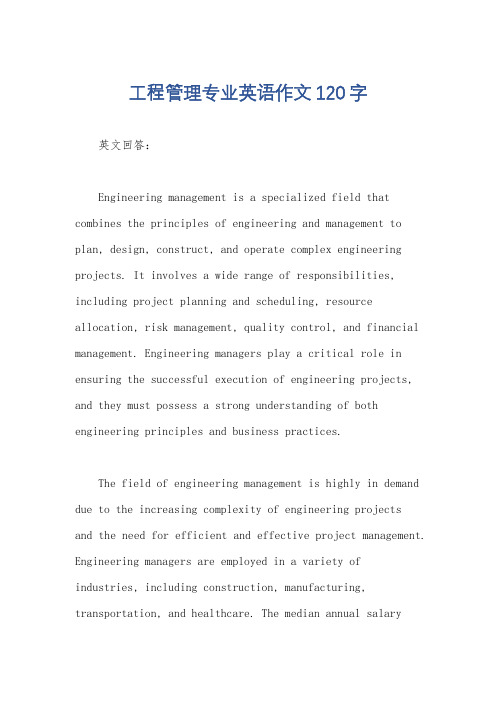
工程管理专业英语作文120字英文回答:Engineering management is a specialized field that combines the principles of engineering and management to plan, design, construct, and operate complex engineering projects. It involves a wide range of responsibilities, including project planning and scheduling, resource allocation, risk management, quality control, and financial management. Engineering managers play a critical role in ensuring the successful execution of engineering projects, and they must possess a strong understanding of both engineering principles and business practices.The field of engineering management is highly in demand due to the increasing complexity of engineering projectsand the need for efficient and effective project management. Engineering managers are employed in a variety of industries, including construction, manufacturing, transportation, and healthcare. The median annual salaryfor engineering managers in the United States is $114,450, and the job outlook is expected to be excellent in the coming years.中文回答:工程管理是一个专业领域,它结合了工程和管理的原则,以规划、设计、建造和运行复杂的工程项目。
工程项目管理的英语论文
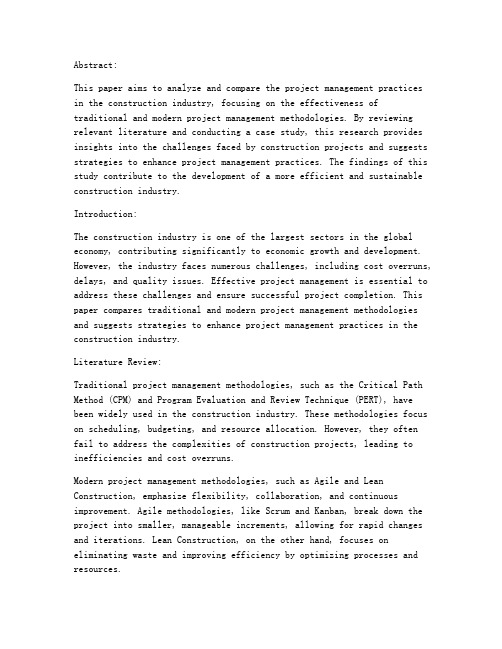
This paper aims to analyze and compare the project management practices in the construction industry, focusing on the effectiveness oftraditional and modern project management methodologies. By reviewing relevant literature and conducting a case study, this research provides insights into the challenges faced by construction projects and suggests strategies to enhance project management practices. The findings of this study contribute to the development of a more efficient and sustainable construction industry.Introduction:The construction industry is one of the largest sectors in the global economy, contributing significantly to economic growth and development. However, the industry faces numerous challenges, including cost overruns, delays, and quality issues. Effective project management is essential to address these challenges and ensure successful project completion. This paper compares traditional and modern project management methodologies and suggests strategies to enhance project management practices in the construction industry.Literature Review:Traditional project management methodologies, such as the Critical Path Method (CPM) and Program Evaluation and Review Technique (PERT), have been widely used in the construction industry. These methodologies focus on scheduling, budgeting, and resource allocation. However, they often fail to address the complexities of construction projects, leading to inefficiencies and cost overruns.Modern project management methodologies, such as Agile and Lean Construction, emphasize flexibility, collaboration, and continuous improvement. Agile methodologies, like Scrum and Kanban, break down the project into smaller, manageable increments, allowing for rapid changes and iterations. Lean Construction, on the other hand, focuses on eliminating waste and improving efficiency by optimizing processes and resources.To illustrate the effectiveness of these methodologies, a case study was conducted on a construction project. The project involved the construction of a residential complex, and the study compared the traditional CPM methodology with the Agile and Lean Construction methodologies.Results:The results of the case study indicated that the Agile and Lean Construction methodologies significantly improved project performance compared to the traditional CPM methodology. The Agile methodology allowed for rapid changes and iterations, leading to shorter project durations and reduced costs. Lean Construction, on the other hand, helped eliminate waste and improve resource allocation, resulting in higher quality outcomes.Discussion:The findings of this study suggest that modern project management methodologies, such as Agile and Lean Construction, can enhance project management practices in the construction industry. These methodologies emphasize flexibility, collaboration, and continuous improvement, which are essential for addressing the complexities of construction projects.Conclusion:In conclusion, this paper compares traditional and modern project management methodologies in the construction industry and suggests strategies to enhance project management practices. The case study results demonstrate the effectiveness of Agile and Lean Construction methodologies in improving project performance. By adopting these methodologies, the construction industry can achieve greater efficiency, cost savings, and quality outcomes.Keywords: Project management, construction industry, Agile, Lean Construction, traditional methodologies, case study。
工程管理英文作文
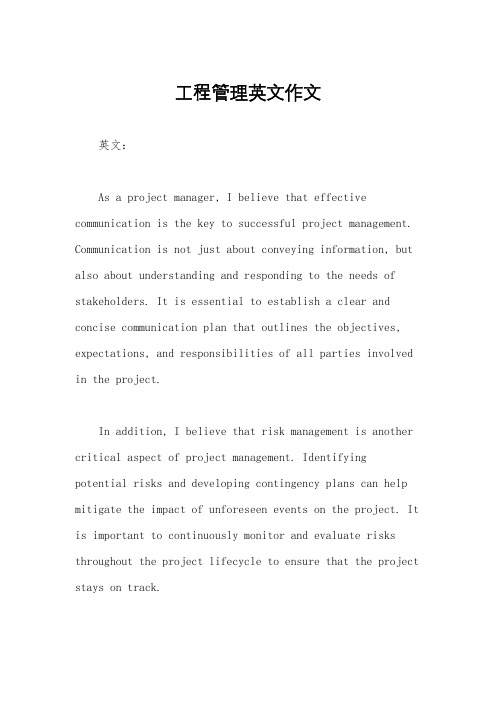
工程管理英文作文英文:As a project manager, I believe that effective communication is the key to successful project management. Communication is not just about conveying information, but also about understanding and responding to the needs of stakeholders. It is essential to establish a clear and concise communication plan that outlines the objectives, expectations, and responsibilities of all parties involved in the project.In addition, I believe that risk management is another critical aspect of project management. Identifyingpotential risks and developing contingency plans can help mitigate the impact of unforeseen events on the project. It is important to continuously monitor and evaluate risks throughout the project lifecycle to ensure that the project stays on track.Furthermore, I think that leadership is a crucial skill for project managers. A good leader should be able to inspire and motivate team members to achieve their best performance. They should also be able to make tough decisions when necessary and provide guidance and support to team members.To illustrate, I once managed a construction project where communication was a challenge due to languagebarriers between the project team and the client. To overcome this, I established a communication plan that included regular meetings with the client and translated project documents. Additionally, I identified potential risks such as weather delays and developed contingency plans to ensure that the project stayed on schedule. Finally, I provided leadership by motivating the team to work together and achieve the project objectives.中文:作为项目经理,我认为有效的沟通是成功的项目管理的关键。
工程项目管理英文版论文
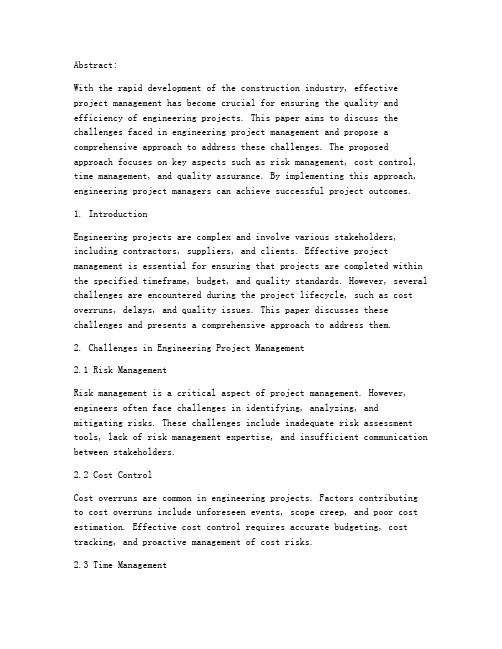
Abstract:With the rapid development of the construction industry, effective project management has become crucial for ensuring the quality and efficiency of engineering projects. This paper aims to discuss the challenges faced in engineering project management and propose a comprehensive approach to address these challenges. The proposed approach focuses on key aspects such as risk management, cost control, time management, and quality assurance. By implementing this approach, engineering project managers can achieve successful project outcomes.1. IntroductionEngineering projects are complex and involve various stakeholders, including contractors, suppliers, and clients. Effective project management is essential for ensuring that projects are completed within the specified timeframe, budget, and quality standards. However, several challenges are encountered during the project lifecycle, such as cost overruns, delays, and quality issues. This paper discusses these challenges and presents a comprehensive approach to address them.2. Challenges in Engineering Project Management2.1 Risk ManagementRisk management is a critical aspect of project management. However, engineers often face challenges in identifying, analyzing, andmitigating risks. These challenges include inadequate risk assessment tools, lack of risk management expertise, and insufficient communication between stakeholders.2.2 Cost ControlCost overruns are common in engineering projects. Factors contributing to cost overruns include unforeseen events, scope creep, and poor cost estimation. Effective cost control requires accurate budgeting, cost tracking, and proactive management of cost risks.2.3 Time ManagementTime management is crucial for ensuring that projects are completed on schedule. However, delays can occur due to various reasons, such as inadequate planning, resource constraints, and poor coordination between project stakeholders.2.4 Quality AssuranceQuality assurance is essential for maintaining the integrity and functionality of engineering projects. However, quality issues may arise due to inadequate design, poor construction practices, or insufficient quality control measures.3. Comprehensive Approach to Engineering Project Management3.1 Risk ManagementTo address risk management challenges, project managers should:- Implement a robust risk management framework that includes risk identification, analysis, and mitigation strategies.- Utilize risk assessment tools and techniques to identify potential risks early in the project lifecycle.- Foster effective communication between stakeholders to ensure a shared understanding of risks and mitigation strategies.3.2 Cost ControlTo control costs, project managers should:- Conduct thorough cost estimation and budgeting to ensure accurate financial planning.- Monitor cost expenditures regularly and take corrective actions to prevent cost overruns.- Implement cost control measures, such as value engineering and alternative procurement strategies.3.3 Time ManagementTo manage project time effectively, project managers should:- Develop a comprehensive project schedule that includes all project activities and milestones.- Allocate resources efficiently to avoid resource conflicts and ensure timely completion of tasks.- Implement change management processes to address schedule deviations promptly.3.4 Quality AssuranceTo ensure project quality, project managers should:- Implement a robust quality management system that includes quality planning, control, and improvement processes.- Conduct regular inspections and audits to identify and rectify quality issues.- Foster a culture of quality within the project team to ensure adherence to quality standards.4. ConclusionEffective project management is essential for the success of engineering projects. By implementing a comprehensive approach that addresses challenges related to risk management, cost control, time management, and quality assurance, project managers can achieve successful project outcomes. This paper provides a framework for project managers to enhance their skills and ensure the successful completion of engineering projects.。
工程管理英语大作文

工程管理英语大作文English: In the field of project management, effective communication plays a crucial role in ensuring the success of a project. Communication is essential for conveying project goals, expectations, deadlines, and updates to team members, stakeholders, and clients. Poor communication can lead to misunderstandings, delays, and ultimately project failure. Project managers must possess strong communication skills to clearly articulate objectives, allocate tasks, provide feedback, and foster collaboration among team members. Effective communication also involves active listening, seeking feedback, and adapting communication styles to cater to different team members' needs and preferences. Additionally, project managers must leverage various communication tools and technologies to facilitate seamless information sharing and collaboration among dispersed team members. Ultimately, clear and consistent communication enhances team morale, productivity, and cohesion, driving the project towards successful completion.中文翻译: 在工程管理领域,高效的沟通对于确保项目成功起着至关重要的作用。
工程项目管理论文双语
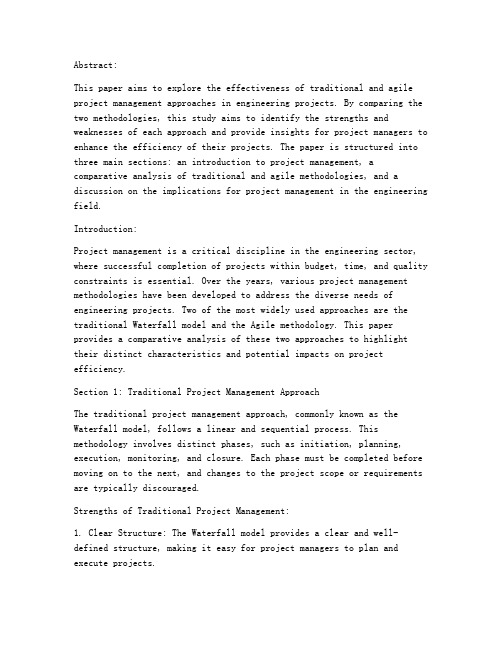
Abstract:This paper aims to explore the effectiveness of traditional and agile project management approaches in engineering projects. By comparing the two methodologies, this study aims to identify the strengths and weaknesses of each approach and provide insights for project managers to enhance the efficiency of their projects. The paper is structured into three main sections: an introduction to project management, a comparative analysis of traditional and agile methodologies, and a discussion on the implications for project management in the engineering field.Introduction:Project management is a critical discipline in the engineering sector, where successful completion of projects within budget, time, and quality constraints is essential. Over the years, various project management methodologies have been developed to address the diverse needs of engineering projects. Two of the most widely used approaches are the traditional Waterfall model and the Agile methodology. This paper provides a comparative analysis of these two approaches to highlight their distinct characteristics and potential impacts on project efficiency.Section 1: Traditional Project Management ApproachThe traditional project management approach, commonly known as the Waterfall model, follows a linear and sequential process. This methodology involves distinct phases, such as initiation, planning, execution, monitoring, and closure. Each phase must be completed before moving on to the next, and changes to the project scope or requirements are typically discouraged.Strengths of Traditional Project Management:1. Clear Structure: The Waterfall model provides a clear and well-defined structure, making it easy for project managers to plan and execute projects.2. Documentation: The emphasis on documentation ensures that all project requirements, plans, and decisions are well-documented and easily accessible.3. Risk Management: The linear nature of the Waterfall model allows for effective risk management by identifying and addressing potential risks at each phase of the project.Weaknesses of Traditional Project Management:1. Rigidity: The Waterfall model is rigid and does not accommodate changes in project requirements or scope.2. Longer Delivery Time: The sequential nature of the Waterfall model often leads to longer delivery times, as each phase must be completed before moving on to the next.3. Less Flexibility: The Waterfall model is less flexible in adapting to changes in project requirements, which can lead to project delays and increased costs.Section 2: Agile Project Management ApproachAgile project management is an iterative and incremental approach that focuses on flexibility, adaptability, and collaboration. This methodology involves breaking the project into smaller, manageable pieces, which are developed and delivered in short cycles known as sprints.Strengths of Agile Project Management:1. Flexibility: Agile allows for changes in project requirements and scope throughout the project lifecycle, making it easier to adapt to evolving needs.2. Early Delivery: The iterative nature of Agile allows for the early delivery of working software, enabling stakeholders to provide feedback and make necessary adjustments.3. Improved Collaboration: Agile emphasizes collaboration among team members, stakeholders, and customers, fostering a more transparent and efficient project environment.Weaknesses of Agile Project Management:1. Complexity: The Agile methodology can be complex to implement and manage, requiring a high level of discipline and commitment from all project participants.2. Documentation: Agile places less emphasis on documentation comparedto the Waterfall model, which can make it challenging to track project progress and changes.3. Scope Creep: The flexibility of Agile can sometimes lead to scope creep, where additional features and requirements are continuously added to the project, leading to delays and increased costs.Section 3: Comparative Analysis and Implications for Engineering Project ManagementComparing the traditional Waterfall model and the Agile methodology, it becomes evident that both approaches have their strengths and weaknesses. The choice of methodology depends on the specific needs and requirements of the engineering project.For projects with well-defined requirements and a fixed scope, the traditional Waterfall model may be more suitable. However, for projects with evolving requirements and a need for flexibility, Agile is often a better choice.The implications of these methodologies for engineering project management are significant. Project managers must understand thedistinct characteristics of each approach and be able to select the most appropriate methodology for their projects. This requires a thorough analysis of project requirements, stakeholder expectations, and the project environment.Conclusion:In conclusion, this paper has provided a comparative analysis of traditional and agile project management approaches in the engineering sector. By understanding the strengths and weaknesses of each approach, project managers can make informed decisions to enhance the efficiencyof their projects. The choice of methodology depends on the specific needs of the project, and a well-informed project manager caneffectively leverage the advantages of both approaches to achieve successful project outcomes.中文摘要:本文旨在探讨传统和敏捷项目管理方法在工程项目中的有效性。
工程管理专业 英文 作文
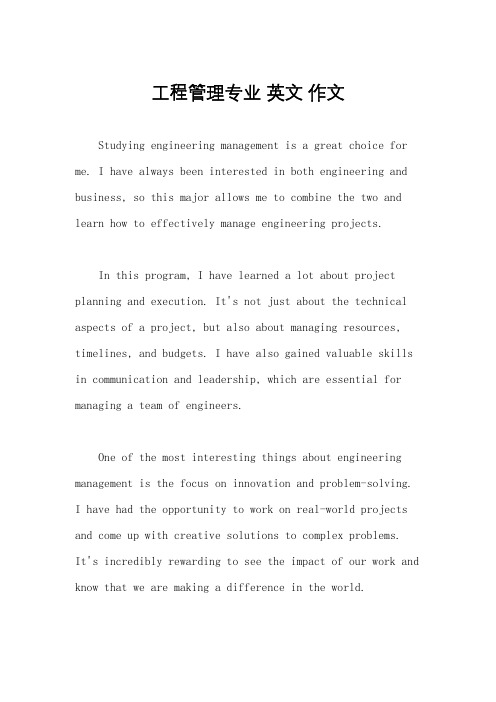
工程管理专业英文作文Studying engineering management is a great choice for me. I have always been interested in both engineering and business, so this major allows me to combine the two and learn how to effectively manage engineering projects.In this program, I have learned a lot about project planning and execution. It's not just about the technical aspects of a project, but also about managing resources, timelines, and budgets. I have also gained valuable skills in communication and leadership, which are essential for managing a team of engineers.One of the most interesting things about engineering management is the focus on innovation and problem-solving.I have had the opportunity to work on real-world projects and come up with creative solutions to complex problems.It's incredibly rewarding to see the impact of our work and know that we are making a difference in the world.Another important aspect of this major is learning about risk management. In any engineering project, there are potential risks that need to be identified and mitigated. I have learned how to assess risks and develop strategies to minimize their impact on the project.Overall, studying engineering management has been a challenging but rewarding experience. I have developed a wide range of skills that will be valuable in my future career, and I am excited to see where this major will take me.。
- 1、下载文档前请自行甄别文档内容的完整性,平台不提供额外的编辑、内容补充、找答案等附加服务。
- 2、"仅部分预览"的文档,不可在线预览部分如存在完整性等问题,可反馈申请退款(可完整预览的文档不适用该条件!)。
- 3、如文档侵犯您的权益,请联系客服反馈,我们会尽快为您处理(人工客服工作时间:9:00-18:30)。
It is well known that the specialty—construction management plays a more and more significant role in the development of the society in recent years. From the beginning its came into being to its change with the reform of economic system, construction management also change its process of development. Nowadays, the development of marketization and internationalization spur the rationalization and scientification of engineering cost supervision system, so the way to engineering quota management was carried by the separation of quantity and price, and then establish a mechanism which market competition directed by project quota gradually. Meanwhile, enhancing economic plausibility and rationality, establishing relative message network system and timely release of information, to lining with the needs of market. Our government should enhance the supervision of construction cost, establish the supervision system of construction cost gradually, and normalize the behavior of pricing, to ensure the smooth of project quality and construction.The quality management of construction project is a systemic project, from feasibility study, survey and design to construction, acceptance check and so on, all of this have a problem of quality control. The management of project construction not only is a process to form project entity, but also is a key stage of quality of the final product. So the quality control in management of project construction is the key link in the whole process in project construction, the project quality mainly depend on the management of quality in process of construction stage.Modern engineering project have a tendency to develop into large scale andmodern with the complexity of project increase exponentially, only manage and control strictly, the quality and schedule of construction can be guaranteed under the condition of growing investments.Therefore, modern project management mode of “Make detailed planning comprehensively, according to plan strictly, feedback and update timely, track and contrast closely” can’t carry out only through manual lab, only using computer business management system and simple computer network manage pattern also can’t meet the actual manage demand. On this basis, we think that modern construction project management enterprise to realize modern management model need shifting to intellective management enterprise, establishing the theory and practice framework of enterprise knowledge management combined with computer, knowledge will become the sword of management.Since the reform and opening-up, the numbers of China construction enterprise have increasing rapidly, but from the actual situation there is a gap between China and international in ability to construction project management, which affects the project management level in China. And the quality of project is an important indicator of project management, Therefore, reforming traditional project management model and improve the quality of quality have became import issue of construction enterprises.The construction industry is one of basic industries in our country, its normal operation related to the sustained development of the national economy directly. In recent years, with the development of market economy have been establishedand perfected gradually in China, the construction industry has got an unprecedented improvement. Meanwhile, the rapid development has exposed many problems, the construction project quality, especially the residential construction quality, has became the focus of attention. Engineering projects as construction project products invests and consumes much manual lab, material and energy, construction project quality related to engineering applicability and safeties of lives and property of people. On the other hand, it’s related to the survival of enterprises, so the quality management on the top position is imperative.Construction project item management is a one-time comprehensive management and control to optimizing the goal with target, goal and content based on specific construction projects. Its connotation is: from the project start to finish, reaching the goal of quality, rate of progress, cost and safety through the project planning and project control. In view of the construction project is disposable, in order to save investment, achieve the goal of energy-saving emission and construction target, and build construction products in accordance with the requirements, we construction personnel must be aware of the importance of project management in the construction process, and pay attention to reinforcing the following aspects in the construction project management in particular case.(I) Quality managementQuality is the life of enterprises and the fundamental guarantee for the development of enterprises. Today, construction market competition has more and more intense. How to improve the quality of the construction management level isevery enterprise managers need to think about.(i) Regime of quality supervisionThe quality management of the construction project can be summarized by the following words: set goals and clear the lines of responsibility; assign and put it into effect, explain in detail; contra posing the difficulty organizes research; set an example and explore experiences; tracking control and control strictly, do a good job of quality control and regular monitor of the quality of products. Establishing and improving the system of whole process quality monitoring, intervening and controlling project quality through scientific method, means and control mechanism to let the project quality always in a dynamic management.①Establish the system of quality self-checking. The quality of project involves all aspects of society, and also reflects the level of enterprises management synthetically. In general, any construction project should accept supervision from the enterprises itself. Enterprises self-checking require any construction company establish a effective system of quality supervision, and through the run of this system to improve quality continuously.②Quality supervision by the third-party. It means enterprises should accept the supervision by owner, and the type of supervision is the most authoritative now. These two types of quality supervision in above work clearly, communicate closely and compose to the complete system of control construction project quality, so that enterprises can promise project quality achieve desired expect.(ii) The supervision methods and meansAs an administrative staff, controlling the quality of engineering construction is the most important thing in locale management. Whether the quality of project is good or bad depends on the management level of inspector and the supervision.①The site supervision in each process of construction operation should found the problem on-site, point out and correct, use the methods measure honestly combined with overall look-and-feel.②Call all on-site management personnel together to specify the common problem in the construction process, have a in-depth knowledge to construction workers, and correct mistakes timely.③Write the book of quality control and guidance document. For those quality problems may occur or has occurred, we management personnel should do an introduction and countermeasures in detail, clear responsibility and claim related personnel correct on time.(II) Schedule managementWhether the project can be delivered within agreed timeframe have a direct influence on the development of project economic and social effect results benefit. The factor of human, technology, material, equipment, machine, foundation, funds, climate and environment all affect the process of project schedule. In order to do a good schedule management of project, we need solving the following problems focused.①Establish the pattern and framework of project management. A successful project must have a successful management team and a standard work mode, operating procedures and business system.②Establish a strict contract network system. A large project is a community consists of many construction workers, so it needs a strict contract system to mobilize the enthusiasm of all people so that can avoid sabotage and wrangling each other.③Develop a practical project plan of three grades. This plan requires not only the work of construction organization, but also the work of owners, design company and supervision company, what’s more, we should take government which very relative to construction into consideration.④Determine the design company, sign the design contract and the check and review of design quality and speed. Whether the project construction can be carried out smoothly depends on the quality of design.⑤The bids and evaluation of construction organization, the sign of construction contract, including the choice between general contractor and sub-contractors, and sign the contract of support of material and equipment.⑥Handle government formalities in earlier stage project plan and arrange the municipal auxiliary projects. Sufficient communication with government and good relationship are promise to successful project.(III) Cost controlThe type of Construction project cost is divided into the budgetcost, plan cost and actual cost. Under the situation of construction cost meet schedule and quality, through the methods of origination, economics, technology and contracts to control the cost in the range of expect. To tighten the project cost management, we can undertake it in the following aspects:①The enterprises should formulate the work quota, and those money should use according to engineering quantities, and we should calculate the total quantities of manmade. We can control the manmade cost as long as control the manmade quantities so that control the project cost.②Strengthen material management, establish the system of limits of material requisition, manage the material out of storage strictly, lump sum to those material cost much in site.③Improve the utilization rate of equipment and materials. Check on, repair and maintain the construction machine regularly, rented equipment and material should return to rent company on time to speed up the construction period and reduce the rent cost.④Choose a correct construction scheme is the key to shorten the construction period, improve quality and reduce the cost, in the process of construction, we should try our best to search new techniques, new technology, new materials to r educe costs, improve efficiency.⑤Be strict in construction: construction in line with the drawings and the standard, be strict in quality to ensure project quality, reduce the waste of labor and material caused by rework.⑥Streamline the management mechanism, reduce the level of management to save the construction management fees.(IV) Security managementSafety production management of construction projects –organize all activities of production safety, through the control of production factors to reduce or eliminate unsafe behavior and state, does not cause the accident, so as to the normal operation of construction project.①Adhere to principle of security management. Safety and production are synchronous so that if control the production safety also should be controlled, safety contain in the production, what’s more, promote and promise the production. Safe working is common thing of anyone relative with production rather than only relative with minority and security mechanism, lack of full participation, security management does not have vitality, and effect is not obvious.②Adhere to control the unsafe behaviors of human and unsafe states of things. From the analysis of the causes of the accident, we can get that human, things and environment is the fundamental reason of accident. From the human and things management sides to analyze accident, unsafe human behaviors and unsafe things states are both fundamental reason of accident.③Establish safety management measures. Strengthen the safety management of construction engineering, formulate practical safety management system and measures are very important. According to the productioncharacteristics of construction engineering , formulate the detailed project safety risk prediction and the corresponding guarantee measure and decompose the project risk, implement the safety responsibility to every apartment, every team and everyone to easier management.To sum up, the construction project management is a systematic project which includes risk, investment, contract, schedule, quality, personnel and other aspects of the work, and relates to the design, supervision, construction, equipment, materials, operations and other departments and units. Therefore, only all sides cooperate positively and cogent strengthen construction engineering management of quality, cost, schedule and security so that construction engineering project can be carried out smoothly and create a good economic benefits for the enterprise.。
